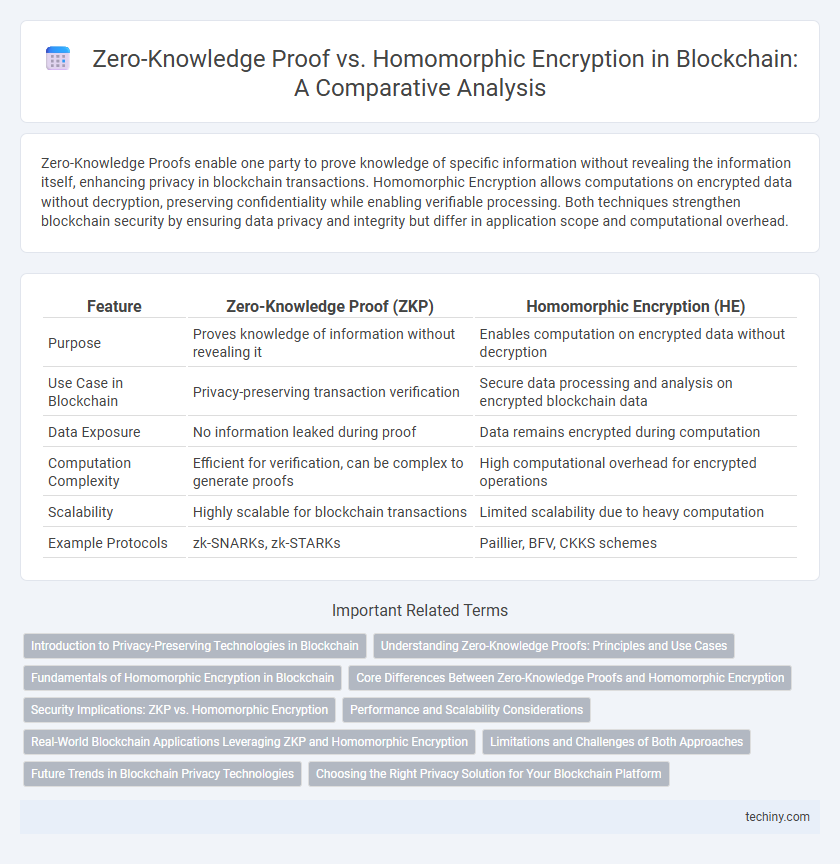Zero-Knowledge Proofs enable one party to prove knowledge of specific information without revealing the information itself, enhancing privacy in blockchain transactions. Homomorphic Encryption allows computations on encrypted data without decryption, preserving confidentiality while enabling verifiable processing. Both techniques strengthen blockchain security by ensuring data privacy and integrity but differ in application scope and computational overhead.
Table of Comparison
| Feature | Zero-Knowledge Proof (ZKP) | Homomorphic Encryption (HE) |
|---|---|---|
| Purpose | Proves knowledge of information without revealing it | Enables computation on encrypted data without decryption |
| Use Case in Blockchain | Privacy-preserving transaction verification | Secure data processing and analysis on encrypted blockchain data |
| Data Exposure | No information leaked during proof | Data remains encrypted during computation |
| Computation Complexity | Efficient for verification, can be complex to generate proofs | High computational overhead for encrypted operations |
| Scalability | Highly scalable for blockchain transactions | Limited scalability due to heavy computation |
| Example Protocols | zk-SNARKs, zk-STARKs | Paillier, BFV, CKKS schemes |
Introduction to Privacy-Preserving Technologies in Blockchain
Zero-Knowledge Proofs (ZKPs) enable one party to prove knowledge of a secret without revealing the secret itself, enhancing blockchain privacy by validating transactions confidentially. Homomorphic Encryption allows computations on encrypted data, preserving confidentiality while enabling data processing and verification in decentralized networks. Both technologies are fundamental in developing privacy-preserving blockchain solutions that protect user data without compromising transparency or security.
Understanding Zero-Knowledge Proofs: Principles and Use Cases
Zero-Knowledge Proofs (ZKPs) enable one party to prove knowledge of specific information to another party without revealing the actual data, enhancing privacy in blockchain transactions. These proofs rely on principles like completeness, soundness, and zero-knowledge property to ensure data validity without exposure. ZKPs are widely applied in privacy-preserving cryptocurrencies, secure voting systems, and identity verification within decentralized networks.
Fundamentals of Homomorphic Encryption in Blockchain
Homomorphic encryption enables computations on encrypted blockchain data without revealing the underlying information, ensuring privacy and security throughout transactional processes. This cryptographic method supports operations such as addition and multiplication directly on ciphertexts, preserving data confidentiality while enabling verifiable smart contract execution. By integrating homomorphic encryption, blockchain systems achieve enhanced data integrity and secure multi-party computations without exposing sensitive inputs.
Core Differences Between Zero-Knowledge Proofs and Homomorphic Encryption
Zero-Knowledge Proofs enable one party to prove knowledge of specific information without revealing the information itself, focusing on privacy verification in blockchain transactions. Homomorphic Encryption allows computations to be performed directly on encrypted data without decryption, preserving confidentiality while enabling data processing. The core difference lies in Zero-Knowledge Proofs verifying data possession without disclosure versus Homomorphic Encryption facilitating secure computation on encrypted data.
Security Implications: ZKP vs. Homomorphic Encryption
Zero-Knowledge Proof (ZKP) enhances blockchain security by enabling the verification of data authenticity without revealing the data itself, minimizing exposure to potential breaches. Homomorphic Encryption allows computations on encrypted data, preserving confidentiality but requiring more computational resources and posing risks if encryption parameters are weak. Both methods offer robust privacy-preserving mechanisms, with ZKP excelling in identity verification and Homomorphic Encryption being suited for secure data processing within distributed ledgers.
Performance and Scalability Considerations
Zero-Knowledge Proofs enable validation of transactions without revealing underlying data, offering faster verification times and reduced data overhead compared to Homomorphic Encryption, which requires substantial computational resources for encrypted data processing. Homomorphic Encryption excels in preserving data privacy during complex computations but often suffers from latency issues and scalability challenges in large-scale blockchain networks. Therefore, Zero-Knowledge Proofs are typically more suitable for high-throughput environments demanding efficient consensus, whereas Homomorphic Encryption aligns better with scenarios prioritizing secure computation over performance.
Real-World Blockchain Applications Leveraging ZKP and Homomorphic Encryption
Zero-Knowledge Proof (ZKP) enables blockchain platforms like Zcash and Ethereum to validate transactions without revealing sensitive data, enhancing privacy and scalability in decentralized finance. Homomorphic Encryption allows computations on encrypted data, supporting secure data analysis in blockchain-based healthcare and supply chain systems without exposing underlying information. Combining ZKP with Homomorphic Encryption accelerates confidential smart contract execution, fostering trustless environments in enterprise blockchain solutions.
Limitations and Challenges of Both Approaches
Zero-Knowledge Proofs face scalability challenges due to their computational intensity and complexity in generating succinct proofs for large datasets. Homomorphic Encryption struggles with performance overhead and limited support for complex operations, resulting in slower processing times and higher resource consumption. Both approaches require advanced cryptographic expertise for implementation and face trade-offs between security, efficiency, and usability in blockchain applications.
Future Trends in Blockchain Privacy Technologies
Zero-Knowledge Proof (ZKP) and Homomorphic Encryption are pivotal in advancing blockchain privacy by enabling secure data verification and computation without exposing sensitive information. Future trends indicate increased integration of ZKP for scalable, trustless transactions alongside homomorphic encryption to facilitate confidential smart contracts and decentralized finance applications. Emerging hybrid solutions combining both technologies aim to optimize privacy and efficiency, addressing scalability challenges in blockchain ecosystems.
Choosing the Right Privacy Solution for Your Blockchain Platform
Zero-Knowledge Proofs enhance blockchain privacy by allowing one party to prove knowledge of information without revealing the data itself, ideal for confidential transactions and identity verification. Homomorphic Encryption enables computation on encrypted data without decryption, supporting secure data analysis and smart contracts without exposing sensitive information. Selecting the appropriate privacy solution depends on the blockchain platform's need for transaction confidentiality, computational efficiency, and the complexity of privacy requirements within decentralized applications.
Zero-Knowledge Proof vs Homomorphic Encryption Infographic

 techiny.com
techiny.com